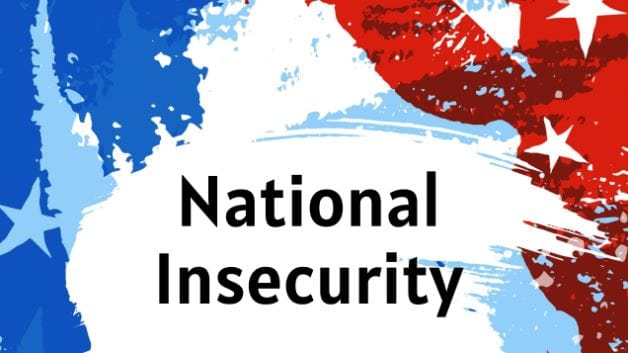National Security or National Insecurity?

National security has been a central focus of U.S. policy in recent years, with numerous decisions and actions taken to address perceived threats both internal and external. These measures have had significant impacts on Corporate America and the broader economic landscape. The Nippon Steel and TikTok ban exemplifies the broad implications of our actions.
Nippon Steel
On January 3, 2025, President Joe Biden blocked the acquisition, citing national security risks. This decision marked the first time an American president has banned a merger and acquisition deal involving a Japanese corporation.
In December 2023, Nippon Steel, Japan's largest steelmaker, announced a $14.9 billion bid to acquire U.S. Steel. This deal would have created one of the world's largest steel producers, with Nippon Steel aiming to increase its global steel output to 85 million tons.
Pros of the Acquisition
Technological Advancements: Nippon Steel could provide U.S. Steel access to new sustainable technologies and foster advancements in green steel production.
Financial Stability: The combined operations could bring operational efficiencies, reduce overhead, and cut costs, potentially boosting U.S. Steel's financial stability.
Global Competitiveness: The merger could create a more competitive entity in the global steel marketplace, better positioned to face challenges from countries like China.
Job Preservation: Nippon Steel pledged to preserve more than 14,000 U.S. jobs and promised significant investments in U.S. Steel's facilities.
Innovation and Research: Nippon Steel's focus on research and development could potentially improve product quality and manufacturing processes.
Cons of the Acquisition
National Security Concerns: The foreign ownership of a major U.S. steel producer raised questions about supply chain vulnerability, especially for defense applications.
Job Losses: Despite promises, mergers often result in redundancies and potential layoffs.
Trade Policy Impact: Allowing a global company to own a U.S. steel producer could potentially influence trade and tariff decisions.
Loss of Domestic Control: Critics argued that placing a significant share of U.S. steelmaking capacity under foreign control could risk national interests.
Union Opposition: The deal faced strong opposition from steel unions, concerned about potential job losses and changes in labor agreements.
Implications
U.S. Steel's Future: Without the investment from Nippon Steel, U.S. Steel may face challenges in growth and modernization.
International Relations: The decision could potentially strain U.S.-Japan relations, with Japan's minister of economy calling the decision "incomprehensible and regrettable".
Foreign Investment Climate: This case may set a precedent for future international investments in American firms, potentially deterring foreign acquisitions.
Domestic Steel Industry: The decision reflects a broader debate about the future of the U.S. steel industry and its role in national security and economic policy.
This case highlights the complex interplay between economic interests, national security concerns, and international relations in today's globalized economy.
TikTok
The TikTok case represents a complex intersection of national security concerns, technological competition, and data privacy issues. Here's an expanded view of the situation:
National Security Concerns
- Data Collection: TikTok collects vast amounts of user data, including sensitive information. The U.S. Justice Department argues that this data collection poses a national security threat
- Chinese Ownership: TikTok is owned by ByteDance, a company based in China. This raises concerns about the Chinese government's potential access to American user data
- Influence Operations: There are fears that TikTok could be used for "weaponized influence," allowing the Chinese Communist Party (CCP) to control content visibility and potentially spread propaganda
- Cybersecurity Risks: Experts warn of potential sophisticated cyber threats, including surveillance, data breaches, and manipulation of online discourse
Competition and Innovation
While national security is the primary stated concern, the TikTok case also reflects broader issues of technological competition:
- Market Dominance: TikTok's rapid rise and popularity, especially among younger users, has challenged established U.S. social media platforms.
- Technological Edge: The app's advanced algorithm and content recommendation system have set new standards in social media engagement.
- Data as a Strategic Asset: The vast amount of user data collected by TikTok could potentially be used to train AI systems, including deepfake generators, giving China an advantage in AI development
Dilemmas and Complexities
- User Impact: A ban would affect approximately 170 million American users, potentially leading to significant public backlash
- First Amendment Concerns: TikTok is challenging potential bans on First Amendment grounds, arguing for free speech protections
- Global Information Flows: Restricting TikTok raises questions about the balance between national security and the benefits of global digital connectivity.
- Precedent Setting: The TikTok case could set precedents for how the U.S. deals with foreign-owned technology companies and apps in the future.
Context of Competition
While national security is the primary justification for potential TikTok restrictions, the case is also viewed in the context of U.S.-China technological competition:
- Tech Supremacy: The TikTok debate reflects broader concerns about maintaining U.S. technological leadership in the face of China's growing capabilities.
- Data Economy: Control over large datasets is increasingly seen as a strategic asset in the development of AI and other advanced technologies.
- Market Access: Some argue that restricting TikTok is a response to China's own limitations on U.S. tech companies operating in its market.
National Security
National security is a cornerstone of modern governance, a necessary shield against the evolving threats that nations face. Over the past five years, the United States has seen an intensification of efforts to bolster national security—politically, economically, and militarily. Yet, these measures often provoke a deeper question: Are we becoming more secure, or are we sacrificing growth, openness, and prosperity in the name of protection?
Recent Political and Economic Decisions
Trade and Economic Policies
Tariffs and Trade Wars: The U.S. administration’s decision to impose tariffs on Chinese goods, citing intellectual property theft and economic espionage, marked a significant pivot toward economic protectionism. These measures, while intended to secure American innovation and jobs, also strained international relationships and disrupted global supply chains.
CHIPS Act (2022): In response to growing dependence on foreign semiconductors, Congress passed the CHIPS Act, providing $52 billion in subsidies to boost domestic chip manufacturing. While this reduces reliance on adversarial nations, it raises concerns about the long-term sustainability of such subsidies.
Export Restrictions on Technology: Restrictions on exporting advanced technologies, particularly to China, are framed as measures to prevent the use of American innovations in adversarial military advancements. However, they risk alienating trade partners and limiting market opportunities for U.S. companies.
Immigration and Border Security
Reduced Immigration: Policies aimed at curbing immigration, including strict border controls and reduced H-1B visa issuance, have been justified on national security grounds. However, these policies have also exacerbated labor shortages in critical sectors like technology and healthcare.
Surveillance and Data Protection: The push to limit foreign access to U.S. citizens’ data, exemplified by scrutiny over TikTok and similar platforms, underscores growing concerns over digital espionage. While these measures aim to protect privacy and national security, they spark debates about freedom and global digital trade.
Defense and Military Initiatives
Increased Defense Budgets: Defense spending has reached historic highs, surpassing $850 billion in 2023. Investments in cybersecurity, AI-driven defense systems, and hypersonic weapons are aimed at countering threats from Russia and China.
Withdrawal from Afghanistan: The chaotic withdrawal in 2021 raised questions about America’s ability to manage long-term military engagements and its impact on global alliances.
Expansion of NATO: In response to Russia’s aggression in Ukraine, NATO has strengthened its presence in Eastern Europe. The U.S. has committed significant resources, further entwining its security with European stability.
Internal and External Threats
Internal Vulnerabilities
Cybersecurity: Critical infrastructure, including energy grids, hospitals, and financial institutions, remains vulnerable to cyberattacks, as highlighted by the Colonial Pipeline ransomware attack in 2021.
Domestic Extremism: The rise in domestic terrorism, including politically motivated violence, underscores internal divisions that threaten national cohesion.
Supply Chain Fragility: Over-reliance on global supply chains for essentials, from pharmaceuticals to semiconductors, became apparent during the COVID-19 pandemic, exposing vulnerabilities.
External Threats
Great Power Competition: Rivalries with China and Russia dominate U.S. foreign policy, with concerns over territorial aggression, cyber espionage, and economic coercion.
Global Terrorism: While diminished, terrorist groups like ISIS and Al-Qaeda remain active, requiring vigilance.
Climate Change: Increasingly viewed as a national security issue, climate change’s impacts—from resource scarcity to migration—pose long-term threats.
The National Security Paradox
While these measures address real and perceived threats, they also present dilemmas:
Economic Growth vs. Security: Policies like the CHIPS Act aim to strengthen domestic resilience but could stifle innovation and trade by limiting global collaboration.
Freedom vs. Surveillance: Increased surveillance under the guise of security raises concerns about civil liberties and trust in government.
Isolation vs. Engagement: Restrictive immigration and trade policies could isolate the U.S. from global talent and partnerships, reducing its competitive edge.
Is National Security a Shield or a Barrier?
The use of national security as a rationale often veils economic or political objectives. For instance, tariffs aimed at "protecting" industries may serve as tools for economic leverage. Similarly, framing immigration as a security risk can ignore its economic benefits. This duality creates a "double meaning" where security becomes both a genuine necessity and a pretext for broader policy agendas.
The Path Forward: Balancing Act
To ensure national security without compromising prosperity:
Invest in Resilience: Strengthen cybersecurity, diversify supply chains, and invest in critical infrastructure.
Promote Openness: Encourage global talent and innovation while safeguarding against genuine threats.
Strengthen Alliances: Work collaboratively with allies to address shared challenges like climate change and cyber threats.
Transparent Policies: Clearly define and communicate the objectives of security measures to build trust and accountability.
National security is a dynamic and evolving imperative, but it must be pursued with balance. The U.S. faces the challenge of navigating a complex global landscape without succumbing to insular tendencies that may hinder long-term growth and collaboration. By addressing threats thoughtfully and transparently, the U.S. can enhance both its security and its position as a global leader.











